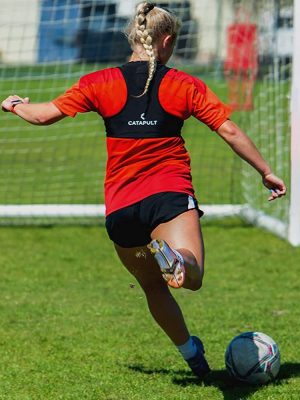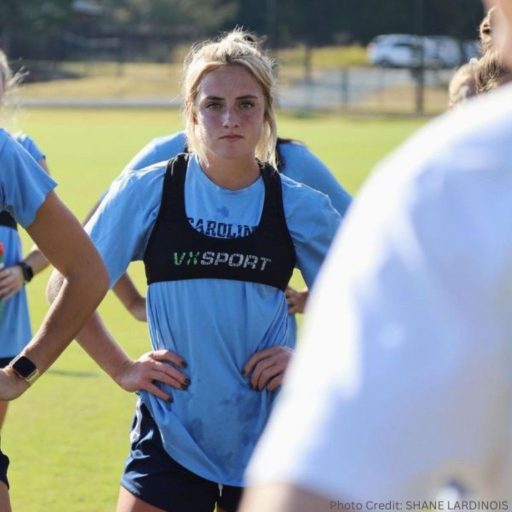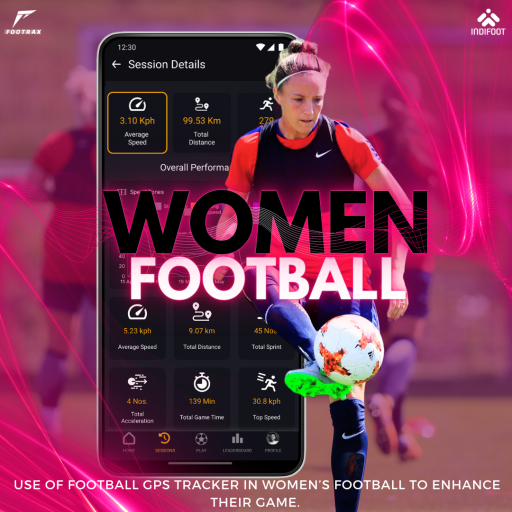Remote GPS Tracking Technology
For Soccer Player Evaluations
Table of Contents
Kickoff
With the advancements in technology, remote assessments have become increasingly popular in the realm of women’s soccer. Coaches and scouts now have the ability to evaluate players using video, virtual training, and online platforms, making it convenient and accessible for players to showcase their skills regardless of their location.
In this article, we will explore the advantages of remote player evaluation in soccer, focusing specifically on the utilization of GPS technology for performance analysis. We will also delve into the challenges of data accuracy in GPS player assessment and address the privacy concerns associated with this form of tracking.

The Rise of Remote Player Assessment
Remote player assessment has revolutionized player development and performance analysis in soccer. Traditionally, players were required to attend college ID camps, combines, or trials before college or professional scouts and coaches to showcase their abilities. However, with the advent of remote assessments, players now have the opportunity to be evaluated without the need for extensive travel or physical presence at these events.
Soccer Talented, a website dedicated to women’s soccer, has taken the initiative to investigate various apps and GPS tracking devices that can aid players in improving their skills remotely. By leveraging technology, Soccer Talented aims to provide players with training resources and assessments that can be accessed from anywhere. This approach allows talented players to gain exposure and receive feedback without the constraints of geographical limitations.
The Advantages of GPS Technology in Soccer Performance Analysis
GPS technology has completely transformed the way in which remote player assessment is conducted, particularly in the world of soccer. With the help of GPS devices specifically designed to be worn by players during training and matches, coaches and analysts can now access data that can be extremely useful in analyzing and evaluating player performance.
The advantages of GPS technology in soccer performance analysis are numerous and incredibly significant. This technology offers valuable information about a player’s speed, distance, and even heart rate that can be used to improve their training regime, monitor their recovery process and optimize tactical strategies.
GPS technology also provides coaches with real-time data during matches, allowing them to make informed decisions regarding player fatigue, substitutions, and overall team performance. GPS technology has completely transformed how soccer players are assessed, allowing for a more comprehensive and scientific understanding of their capabilities.
Player Development and Improvement
The emergence of GPS technology has revolutionized the way coaches evaluate their players’ performances. Using GPS data, coaches can pinpoint areas that require improvement in a player’s skill set based on their distance covered, speed metrics, and acceleration patterns.
As a result, it has become increasingly easier for coaches to identify their players’ strengths and weaknesses and tailor their training programs accordingly. By understanding a player’s physical capabilities in great detail, coaches can design targeted training programs that aim to enhance specific aspects of a player’s game.
This not only helps players improve their overall performance but also ensures they receive training customized to their individual needs. The ability to accurately assess a player’s physical capabilities through GPS technology has significantly improved how sports teams approach player development.
Video Analysis for Performance Improvement
Pairing GPS data with video analysis provides a more comprehensive assessment of a player’s performance. By integrating visual aids, coaches can gain a deeper insight into a player’s decision-making skills, tactical awareness, and overall effectiveness on the field.
This approach is particularly effective when combining raw analytics from GPS data that highlights positioning with video footage that captures player movements; the result is an unparalleled level of information that can provide valuable insights into a player’s potential.
This method is increasingly becoming a go-to for coaches and sports analysts alike, as it offers an exhaustive review of a player’s capabilities and readiness to advance to higher levels of play. Hence, synthesizing GPS data with video analysis has become a powerful tool in sports evaluation, providing coaches with a decisive edge to help their players excel.
Impact on Performance Monitoring and Injury Prevention
GPS technology has emerged as a game-changer in athletic performance monitoring in recent years. No longer is it enough to rely on coaches’ and trainers’ observations to evaluate and enhance athletes’ skills; now, advancements in GPS technology enable real-time tracking of players’ movements, providing coaches and trainers with in-depth, precise data on everything from acceleration and deceleration to changes in direction and heart rate.
This technology is particularly valuable for female soccer players, who are frequently vulnerable to various injuries, especially those related to sudden stops, changes in direction, and collisions with other players.
By leveraging GPS technology to gain a more comprehensive understanding of players’ performance, coaches and trainers can help minimize injury risk and keep their players healthy and playing at the top of their game. The benefits of this technology extend beyond injury prevention, as well: coaches can use the data collected to tailor training plans and improve overall team performance.
Technology Adoption and Accessibility
Remote player assessment using GPS technology promotes the adoption of innovative tools and techniques in the world of soccer. By embracing technology, coaches and players can stay ahead of the game and leverage data-driven insights to enhance performance. Furthermore, the accessibility of GPS devices and mobile applications makes it easier for players at all levels to engage in remote assessments and benefit from the advancements in performance analysis.
GPS technology is not just about location; it’s about comprehensive performance data. This trove of information can be used to pinpoint strengths and weaknesses. For instance, a player’s sprinting abilities and distances covered can highlight areas for improvement. Real-life case studies underscore the tangible benefits of remote assessment in fostering player growth.
Avoiding Travel: A Game Changer for Female Soccer Players
The issue of female soccer players being restricted in their opportunities due to geography has been a significant hurdle for many years. However, this obstacle has been significantly mitigated with the advent of GPS technology.
Now, players can be evaluated without needing to travel to specific physical locations, thus providing a considerable advantage to female players, who might not have access to the resources and opportunities offered by the more prominent clubs. With this exciting development, female players can now be evaluated on an equal footing to their male counterparts, regardless of their location.
This technological shift holds enormous potential for further enhancing the visibility of female players and opening up more avenues for their inclusion and success in soccer. This promising advancement will undoubtedly create a level playing field for female soccer players and offer previously unavailable opportunities.

Independent Evaluation and Unbiased Assessment
The world of pay-for-play clubs has always been fraught with nuance and subtlety. Often, assessments are not solely based on a player’s performance and skill level but are influenced by other factors such as relationships, loyalty, and the politics of the particular club.
Fortunately, the recent advent of GPS technology has introduced a new level of objectivity into the mix! With the help of independent coaches who are not affiliated with a player’s current club, it is now possible to evaluate athletic ability without any preconceived notions or other extraneous factors.
This unbiased approach ensures that evaluations are accurate, equitable, and truly reflective of an athlete’s talent and potential. Thanks to this revolutionary new approach, players can now look forward to a clearer and more straightforward path to recognition and achievement.
GPS Tracking Systems and Apps
The market is saturated with an impressive array of GPS tracking systems and mobile applications exclusively catering to female soccer players. Leading brands such as Catapult Sports, STATSports, PlayerMaker, and many more offer comprehensive features that facilitate seamless player and coach progress monitoring.
With these cutting-edge technological advancements, athletes and trainers can participate actively in remote assessments that are key to player development. In addition, these tools are incredibly empowering, as they enable players and coaches to access real-time performance analytics, comparisons, and interactive training plans, helping them achieve their goals efficiently.
These GPS tracking and app systems are transforming the world of female soccer by offering customized, female-centric technologies that are vital for the growth and success of individual players and teams.
Lorem ipsum dolor sit amet, consectetur adipiscing elit. Ut elit tellus, luctus nec ullamcorper mattis, pulvinar dapibus leo.
Challenges of Data Accuracy in GPS Player Assessment
While GPS technology offers numerous advantages in soccer player assessment, challenges are associated with ensuring data accuracy. Factors such as signal interference, satellite coverage, and device placement can impact the precision and reliability of the data collected.
Coaches and analysts must be aware of these challenges and take steps to minimize potential inaccuracies. GPS devices should be properly calibrated and positioned on the player’s body to address data accuracy concerns to ensure optimal signal reception.
Additionally, continuous monitoring and quality control measures should be implemented to identify and rectify any potential errors or discrepancies in the data. By maintaining a rigorous approach to data accuracy, coaches can ensure that the insights derived from GPS technology are reliable and meaningful.
Privacy Concerns in Soccer Player Tracking
As with any form of data collection and tracking, privacy concerns arise in the context of GPS player assessment. It is essential to prioritize player privacy and ensure that data collected through GPS devices is handled securely and in compliance with privacy regulations.
Coaches and organizations utilizing GPS technology should implement robust data protection measures, including secure storage, restricted access, and anonymization of personal information. Explicit consent should be obtained from players and their guardians, outlining the purpose and usage of the collected data.
Remote player assessment can be conducted ethically and responsibly by prioritizing privacy and implementing appropriate safeguards.
Independent Evaluation and Unbiased Assessment
The world of pay-for-play clubs has always been fraught with nuance and subtlety. Often, assessments are not solely based on a player’s performance and skill level but are influenced by other factors such as relationships, loyalty, and the politics of the particular club.
Fortunately, the recent advent of GPS technology has introduced a new level of objectivity into the mix! With the help of independent coaches who are not affiliated with a player’s current club, it is now possible to evaluate athletic ability without any preconceived notions or other extraneous factors.
This unbiased approach ensures that evaluations are accurate, equitable, and truly reflective of an athlete’s talent and potential. Thanks to this revolutionary new approach, players can now look forward to a clearer and more straightforward path to recognition and achievement.
Final Whistle
Remote player assessment using GPS technology has revolutionized player development and performance analysis in women’s soccer. By leveraging the power of GPS devices, coaches and analysts can gather valuable data on player movement, distance covered, speed metrics, and positioning data. This data interpretation and analysis enable targeted player development, injury prevention strategies, and tactical improvements.
However, it is essential to address challenges related to data accuracy and privacy concerns. Coaches and organizations must ensure that GPS devices are properly calibrated, and data protection measures are in place to safeguard player privacy.
As technology continues to advance, remote player assessment using GPS technology will play an increasingly significant role in soccer performance analysis. By embracing these innovations and maintaining a strong focus on data accuracy and privacy, coaches and players can unlock new possibilities for enhancing player development and achieving peak performance on the field.

Michael Sullivan,
Soccer Talented CEO
Michael Sullivan, CEO of Soccer Talented, is a accomplished professional in sports, real estate, and business leadership. With degrees from the University of Miami, he's made significant contributions to esteemed organizations like Miami Dolphins and Fort Lauderdale Strikers. His insights are propelling women's soccer at Soccer Talented.
Questions or Comments?
Drop Us a Line




